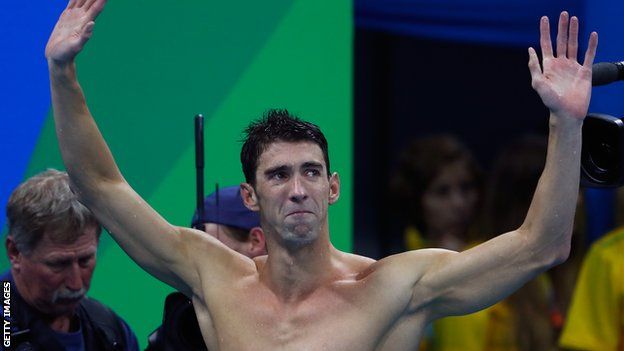Michael Phelps demands more help for former Olympians
- Published

Phelps won five Olympic golds in his final Games at Rio 2016
Legendary US swimmer Michael Phelps says more must be done to support Olympians after they move out of the spotlight.
Phelps, 33, said in January, external that he contemplated suicide during the worst periods of his own depression.
"I don't think there's been much help for when an athlete retires," he said.
"When we're done it's kind of like we're just moved along or brushed aside because there's somebody else that's coming up."
Phelps won a record 23 Olympic gold medals, competing at Sydney 2000, Athens 2004, Beijing 2008, London 2012 and, after retirement and a comeback, Rio 2016.
The American, now retired for good, suffered from depression in the wake of each Games. He was arrested for drink-driving in November 2004, pictured apparently smoking cannabis in November 2008 and, external and barely left his bedroom for days at a time in late 2012.
Phelps, who was treated for mental illness shortly after, says he is encouraged by changes in the leadership of the United States Olympic Committee where chief executive Sarah Hirshland and chair Susanne Lyons have been appointed to their roles in the past year.
"I'm excited to potentially see strides made to give these athletes the support that they deserve both on and off the field of play," said Phelps.
"As somebody who has been on the national team for over 15 years, I hope that the athletes are able to enjoy the experience even better than we did."
More than half of former professional sportspeople had concerns about their mental or emotional well-being in a survey carried out by the Professional Players' Federation in February, with many reporting a loss of identity in the wake of their career ending.
Less than half of those who felt that they had a mental health problem had sought help.
In March, a new government-backed action plan said that all elite sports must have a clear mental health strategy in place by 2024.
- Published21 March 2018
- Published6 February 2018